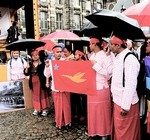For the last two months, Burma has been in a crisis. The long-ruling military regime has been crushing a people’s movement that arose over the removal of fuel subsidies and a 500% hike in fuel costs for an already impoverished populace. Global supporters of democracy have been vocal about the repression. The West wants to impose more sanctions and is urging China—Burma’s largest trading partner—to pressure the Burmese junta.
But what of India, the democracy closest to Burma? The world wants India, which also has an economic interest in Burma, to lend its democratic voice to the cause and put pressure on the generals to stop the killing. In early October the European Union issued a démarche to India, urging it to use its good offices with the junta and reconcile with the democrats. The world has been disappointed.
For those who have been following India’s foreign policy, India’s bumbling is not surprising. The nation has long clamored for a place on the international high table, citing its democratic traditions, size, and strategic geopolitical importance. In reality, however, its foreign policy is still immature. The problem of Burma (renamed Myanmar by the junta) has suddenly thrust an unprepared India into the field along with the professionals.


